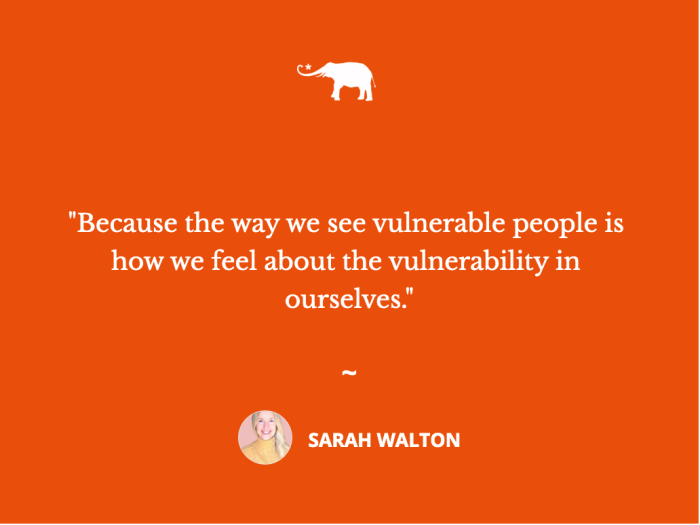View this post on Instagram
One night last year, I was walking along the river in Southbank after a magical night filled with laughter and inspiration.
The city lights glistened on the water and the buzz of Friday night whirled around me.
As I glided across the road to get my tram home, I saw a woman around 30 with long brown hair, curled up on a blanket on the street with an empty donation cup and a cardboard sign asking for help. She was homeless and she was crying. Not “everyday tears”; she was beside herself.
I felt a yearning to stop and comfort her, but I wasn’t sure if she would think I was a weirdo. I asked myself, was I hesitant because of my own self-consciousness, or was my intuition telling me not to go up to her? I tapped in and felt it was my own self-consciousness. I thought, what if she says, “Go away, leave me alone?” Well, I told myself, at least I would have tried.
But what if I can help?
So, I let go of my inhibitions, walked over to her, and crouched down to ask her if she was okay. She was immediately grateful for me checking in on her. Through her devastated sobbing, she told me she had been crying for five days straight, she couldn’t stop, and she was ready to give up. She said she was considering suicide. I reminded her that she matters, that there’s always a way out, and reassured her that I was there to help.
She opened up to me and told me about her struggles and pain, her childhood traumas, her adult traumas, her feelings of hopelessness, and her desperation for a way out. As I listened, I held a loving space, seeing her in her wholeness and light, no matter how painful her stories were. And they were pretty horrific.
Her tears were uncontrollable. She asked for advice. I related to her pain and struggles on a personal level, so I was able to offer some comforting words, but it didn’t seem to matter what I said; she wasn’t able to truly hear or take it in. Her tears were so strong that she was heaving; she seemed inconsolable. I didn’t know what else to do. But I wasn’t giving up.
So I handed it over. I asked something greater than me to take over. And just then, I had an instinct to hug her. Part of me felt self-conscious—was that weird? Would she tell me to rack off? My fears seemed insignificant at that point, so I put them aside and asked her:
“Would it be okay if I hugged you?”
Just like an upset child, she nodded through her tears. I knelt in front of her and reached around her puffy winter jacket for a big bear hug. And as I hugged her, I rubbed her back like the loving mother she was yearning for and said soothingly, “Everything’s going to be okay.”
I kept focusing my attention on seeing her in her light, knowing that she was okay, no matter how much pain was bursting out of her.
And as she sobbed on my shoulder, I felt my love envelop her like a big fire blanket. I kept repeating lovingly, “Everything is going to be okay” while her tears gushed like a flooded river bank that was bursting at the seams. But it still wasn’t enough to drown her raging inferno of pain.
Then she revealed the most heartbreaking part of her trauma. I winced as I held her pain and smothered it in so much love. And then I said with compassion and conviction from the depths of my soul:
“It wasn’t your fault.”
Suddenly, in my loving embrace, I felt her pain shrink, and, like a fire going out, poof! It extinguished in my arms. She sighed deeply, and there was a peaceful silence.
To her surprise, she stopped crying. For the first time in five days.
She coughed then laughed a little nervous laugh and thanked me as her inner spark lit up before my eyes. We were both a little shocked by her sudden shift from inconsolable to vivid aliveness!
I sat down beside her on the blanket, side by side, and we chatted like old friends. From that moment, the joyful part of her—the part of her that I had been holding a vision of in my mind the whole time—came to life like an excited child.
Suddenly, people walking by started dropping money in her cup, gold coins and notes! And they did it with loving eye contact and kind words. I felt the love between us and all around us.
She told jokes, we laughed, and when she spoke about her struggles, it was now with the zest of a motivational speaker, focusing on the lessons and how far she’d come. I kept pointing out her strengths, “You are so smart, you are so beautiful, you are so strong!” and her confidence and light grew as did the money in her donation cup and the love from strangers.
I didn’t want to leave her, but it was late. I asked if there was anything else I could do—resources, money, anything.
She said she just wanted a friend.
She didn’t have a mobile, so she jotted down my phone number on her piece of cardboard and I told her to call me so we could do something fun sometime, like go to the movies. She was delighted!
As we said goodbye, I didn’t know if I’d ever see her again, but I did know that what we shared that night would stay with us both forever.
I have many interactions with people who are homeless, and I don’t often share the stories because I consider them interactions with friends. I don’t see them as less than or think of myself as a “savior.”
I see myself in them.
I see them as an equal, a friend, a family member. When I give someone money or food on the street, I do it as an exchange of love, of connection.
Because the way we see vulnerable people is how we feel about the vulnerability in ourselves.
When we love that part in ourselves, we automatically love that part in others.
Now more than ever, we must remind each other that all parts of us deserve to be loved.
(Note: This experience was effectively somatic reparenting, which should be done in a professional space. This was an exception, guided by my intuition.)
~









Read 0 comments and reply